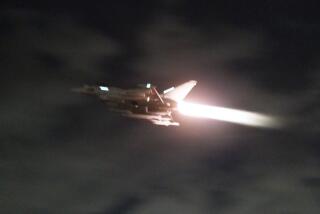GULF WATCH: Day 58 : A Daily Briefing Paper On Developments In The Crisis
- Share via
Diplomatic Front:
The exiled emir of Kuwait told President Bush that Iraq is pillaging his country and repopulating it with outsiders, jeopardizing the prospects of restoring the former government even if Iraqi forces withdraw. After the emir’s two-hour session at the White House, U.S. officials said the timetable for possible military action against Iraq is shortening.
An increasing number of nations are prepared to consider the use of military force if economic sanctions fail to dislodge Iraq from Kuwait, Secretary of State James A. Baker III said after consulting with foreign leaders at the United Nations. Most countries would prefer any military action to be coordinated by the United Nations.
The Bush Administration, fearful of jeopardizing U.S. ties with China, has rejected an offer by the government of Taiwan to contribute $100 million to the cost of the Persian Gulf military buildup, U.S. officials said. Washington urged Taiwan to provide assistance instead to “front-line” nations that have been hard hit by the international embargo.
Millions of Iranians, some shouting “Death to America,” demonstrated in Tehran and other Iranian cities to denounce the military buildup in the Persian Gulf, according to radio reports. The protesters also condemned Iraq’s invasion of Kuwait. Military Front:
U.S. military commanders in Saudi Arabia are concerned that the combat-readiness of their troops has been compromised by Saudi-imposed rules prohibiting use of live ammunition in training exercises. Although some exceptions have been authorized, many soldiers still have not had the opportunity to test-fire their weapons, officials said.
Gen. Michael J. Dugan, the Air Force chief of staff who was fired Sept. 17 for discussing with reporters details of U.S. air-strike plans against Iraq, has been given a new job as special assistant to Air Force Secretary Donald Rice, an Air Force spokesman said.
Iraq accused Israel and Egypt of setting up an intelligence station in Israel’s Negev desert to monitor the movement of Iraqi troops. The Iraqi army newspaper said the station was financed by the former rulers of Kuwait, by the Saudi government and the United States. Crisis Indicators:
Package of U.S. arms to be sold to Saudi Arabia:
150 M-1A2 tanks built by General Dynamics Corp.
12 McDonnell Douglas Corp. Apache attack helicopters
10,000 armored fighting vehicles, trucks and troop carriers made by FMC Corp.
384 Patriot anti-aircraft missiles built by Raytheon Co.
More to Read
Sign up for Essential California
The most important California stories and recommendations in your inbox every morning.
You may occasionally receive promotional content from the Los Angeles Times.













